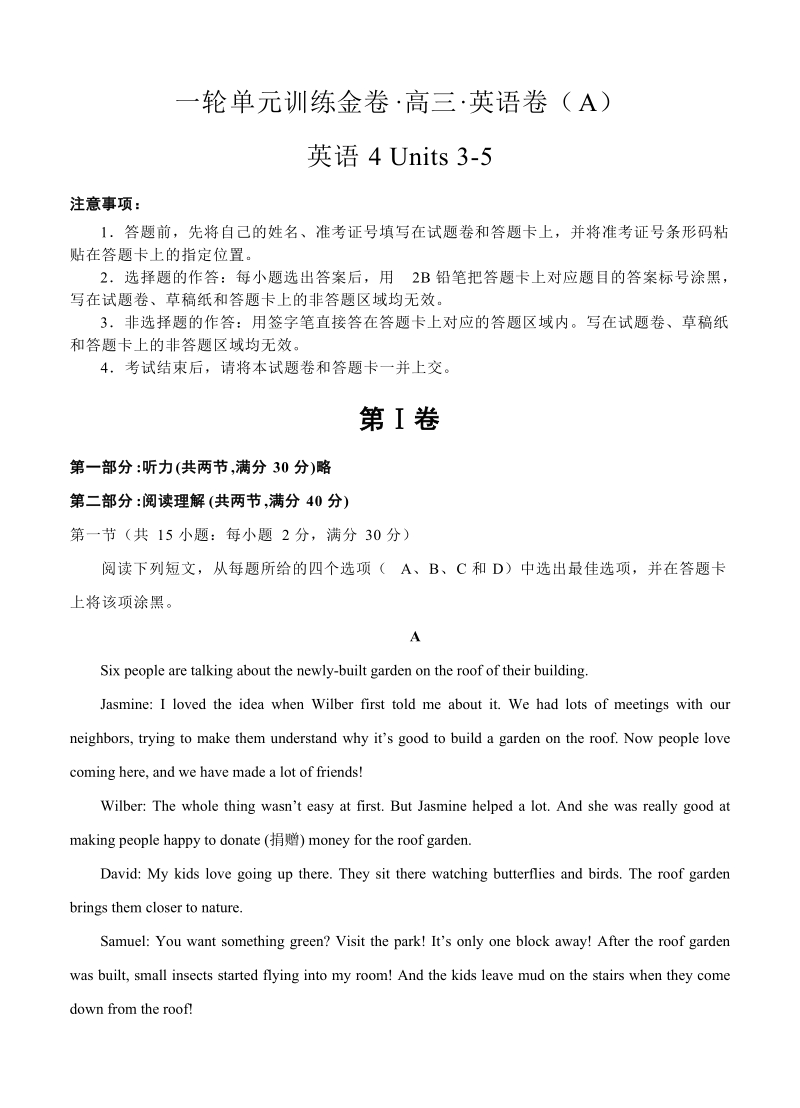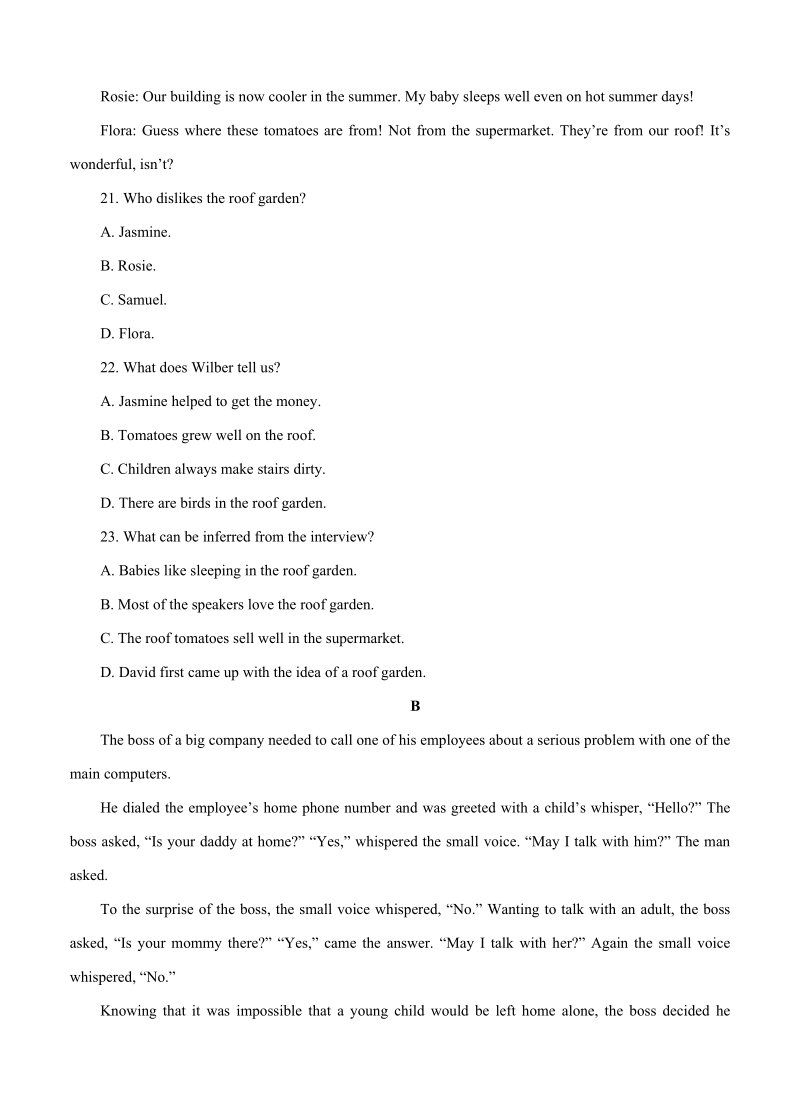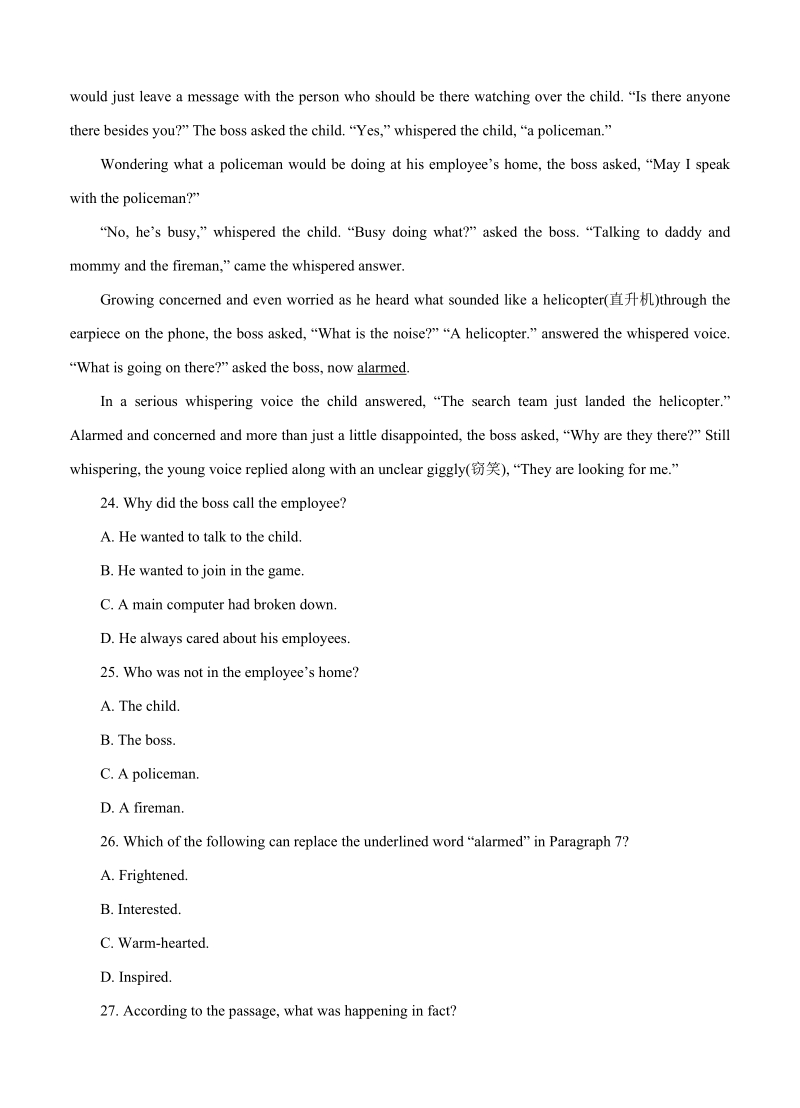 【大师珍藏】高考英语一轮单元训练金卷:第九套 英语4 Units 3-5(A卷)含答案
【大师珍藏】高考英语一轮单元训练金卷:第九套 英语4 Units 3-5(A卷)含答案
《【大师珍藏】高考英语一轮单元训练金卷:第九套 英语4 Units 3-5(A卷)含答案》由会员分享,可在线阅读,更多相关《【大师珍藏】高考英语一轮单元训练金卷:第九套 英语4 Units 3-5(A卷)含答案(12页珍藏版)》请在七七文库上搜索。
1、一 轮 单 元 训 练 金 卷 高 三 英 语 卷 ( A)英 语 4 Units 3-5 注 意 事 项 :1 答 题 前 , 先 将 自 己 的 姓 名 、 准 考 证 号 填 写 在 试 题 卷 和 答 题 卡 上 , 并 将 准 考 证 号 条 形 码 粘贴 在 答 题 卡 上 的 指 定 位 置 。2 选 择 题 的 作 答 : 每 小 题 选 出 答 案 后 , 用 2B 铅 笔 把 答 题 卡 上 对 应 题 目 的 答 案 标 号 涂 黑 ,写 在 试 题 卷 、 草 稿 纸 和 答 题 卡 上 的 非 答 题 区 域 均 无 效 。3 非 选 择 题 的 作 答 : 用 签
2、字 笔 直 接 答 在 答 题 卡 上 对 应 的 答 题 区 域 内 。 写 在 试 题 卷 、 草 稿 纸和 答 题 卡 上 的 非 答 题 区 域 均 无 效 。4 考 试 结 束 后 , 请 将 本 试 题 卷 和 答 题 卡 一 并 上 交 。第 卷第 一 部 分 :听 力 (共 两 节 ,满 分 30 分 )略第 二 部 分 :阅 读 理 解 (共 两 节 ,满 分 40 分 )第 一 节 ( 共 15 小 题 : 每 小 题 2 分 , 满 分 30 分 )阅 读 下 列 短 文 , 从 每 题 所 给 的 四 个 选 项 ( A、 B、 C 和 D) 中 选 出 最 佳 选 项
3、 , 并 在 答 题 卡上 将 该 项 涂 黑 。ASix people are talking about the newly-built garden on the roof of their building.Jasmine: I loved the idea when Wilber first told me about it. We had lots of meetings with our neighbors, trying to make them understand why its good to build a garden on the roof. Now people
4、love coming here, and we have made a lot of friends!Wilber: The whole thing wasnt easy at first. But Jasmine helped a lot. And she was really good at making people happy to donate (捐赠) money for the roof garden.David: My kids love going up there. They sit there watching butterflies and birds. The ro
5、of garden brings them closer to nature.Samuel: You want something green? Visit the park! Its only one block away! After the roof garden was built, small insects started flying into my room! And the kids leave mud on the stairs when they come down from the roof!Rosie: Our building is now cooler in th
6、e summer. My baby sleeps well even on hot summer days!Flora: Guess where these tomatoes are from! Not from the supermarket. Theyre from our roof! Its wonderful, isnt?21. Who dislikes the roof garden?A. Jasmine. B. Rosie.C. Samuel. D. Flora.22. What does Wilber tell us?A. Jasmine helped to get the mo
7、ney.B. Tomatoes grew well on the roof.C. Children always make stairs dirty.D. There are birds in the roof garden.23. What can be inferred from the interview?A. Babies like sleeping in the roof garden.B. Most of the speakers love the roof garden.C. The roof tomatoes sell well in the supermarket.D. Da
8、vid first came up with the idea of a roof garden.BThe boss of a big company needed to call one of his employees about a serious problem with one of the main computers.He dialed the employees home phone number and was greeted with a childs whisper, “Hello?” The boss asked, “Is your daddy at home?” “Y
9、es,” whispered the small voice. “May I talk with him?” The man asked.To the surprise of the boss, the small voice whispered, “No.” Wanting to talk with an adult, the boss asked, “Is your mommy there?” “Yes,” came the answer. “May I talk with her?” Again the small voice whispered, “No.”Knowing that i
10、t was impossible that a young child would be left home alone, the boss decided he would just leave a message with the person who should be there watching over the child. “Is there anyone there besides you?” The boss asked the child. “Yes,” whispered the child, “a policeman.”Wondering what a policema
11、n would be doing at his employees home, the boss asked, “May I speak with the policeman?”“No, hes busy,” whispered the child. “Busy doing what?” asked the boss. “Talking to daddy and mommy and the fireman,” came the whispered answer.Growing concerned and even worried as he heard what sounded like a
12、helicopter(直升机)through the earpiece on the phone, the boss asked, “What is the noise?” “A helicopter.” answered the whispered voice. “What is going on there?” asked the boss, now alarmed.In a serious whispering voice the child answered, “The search team just landed the helicopter.” Alarmed and conce
13、rned and more than just a little disappointed, the boss asked, “Why are they there?” Still whispering, the young voice replied along with an unclear giggly(窃笑), “They are looking for me.”24. Why did the boss call the employee?A. He wanted to talk to the child. B. He wanted to join in the game.C. A m
14、ain computer had broken down. D. He always cared about his employees.25. Who was not in the employees home?A. The child. B. The boss.C. A policeman. D. A fireman.26. Which of the following can replace the underlined word “alarmed” in Paragraph 7?A. Frightened. B. Interested.C. Warm-hearted. D. Inspi
15、red.27. According to the passage, what was happening in fact?A. The child was playing a trick. B. The boss was offering help.C. The employee was in danger. D. The child was missing.CMary bought a dress in a womens clothing store. She felt very happy about buying the dress until she got home. Then sh
16、e remembered she had left her purse at the store. It was the third time that month that Mary had forgotten something important. Mary was angry with herself. She said, “Am I losing it?”Emma was teaching a class in mathematics at a college. She began to explain to the students how to solve a very diff
17、icult problem. She understood it very well. But somehow, at that moment, she could not explain it. Emma said, “I must be losing it.”Americans seem to have a lot of concern about losing it. At least that is what you would think from hearing them talk. They use the expression when they feel they are l
18、osing control. It can mean losing emotional control. Or losing the ability to do something. Or losing intelligence.Word experts differ about how the expression started. Some believe it came from television programs popular in the 1980s.Others believe it began with psychologists, who deal with how pe
19、ople think, feel and act.“We Americans have many concerns about controlling our lives. Perhaps we worry too much,” one psychologist said. “In many situations to say you are losing it eases the tension(不安).”Its healthy. And most people who say they are having a problem are not losing it.People may fe
20、el more like they are losing it when they are “down in the dumps”. Word expert Charles Funk says people have been feeling down in the dumps for more than 400 years. The word dumps probably comes from Northern European countries. The languages of Denmark and Norway both have similar words. The words
21、mean to fall suddenly. Americans borrowed this saying. And, over the years, it has become a popular way of expressing sadness.28. What problem did Mary think she had?A. She easily lost emotional control.B. She had quite low intelligence.C. She seemed to have a poor memory.D. She lost the ability to
22、shop wisely.29. How does the author explain the use of losing it?A. By describing his own experiences.B. By providing research findings.C. By giving instructions.D. By using examples.30. We can infer from the psychologist that .A. Americans worry too much about their health problemsB. its good for y
23、our health to say youre losing itC. people really lose it when they say theyre losing itD. Americans enjoy controlling their lives31. If someone feels down in the dumps, he or she .A. is in low spirits B. is losing somethingC. becomes less popular D. has a sudden fall in lifeDHow many times a day do
24、 you check your email? When you wake up? Before bed? A dozen times in between? The technology that was supposed to make our lives simple has taken up too much time. The average young man spends more than seven hours a day using technological devices(设备), with an additional hour just text-messaging f



- 配套讲稿:
如PPT文件的首页显示word图标,表示该PPT已包含配套word讲稿。双击word图标可打开word文档。
- 特殊限制:
部分文档作品中含有的国旗、国徽等图片,仅作为作品整体效果示例展示,禁止商用。设计者仅对作品中独创性部分享有著作权。
- 关 键 词:
- 大师 珍藏 高考 英语 一轮 单元 训练 第九 Units3 答案
 七七文库所有资源均是用户自行上传分享,仅供网友学习交流,未经上传用户书面授权,请勿作他用。
七七文库所有资源均是用户自行上传分享,仅供网友学习交流,未经上传用户书面授权,请勿作他用。



 浙公网安备33030202001339号
浙公网安备33030202001339号
链接地址:https://www.77wenku.com/p-57394.html